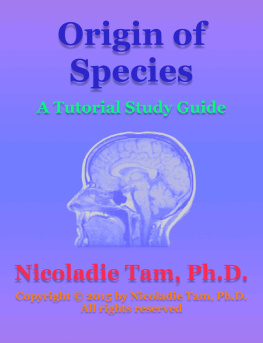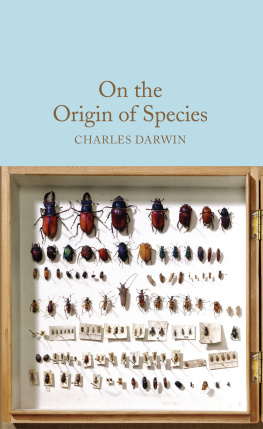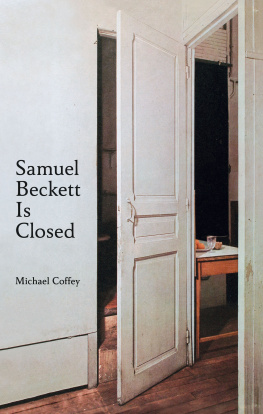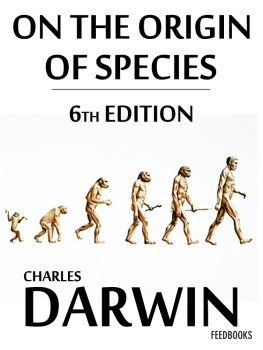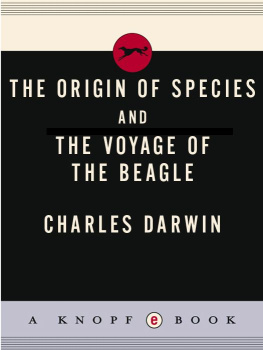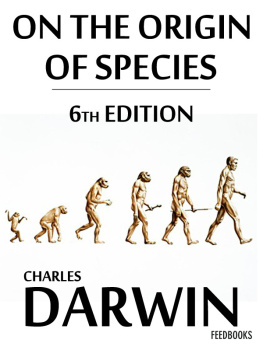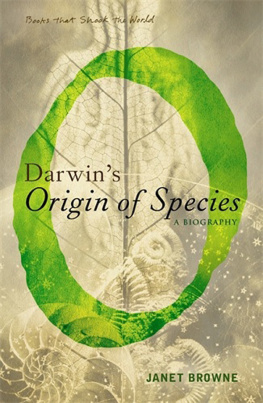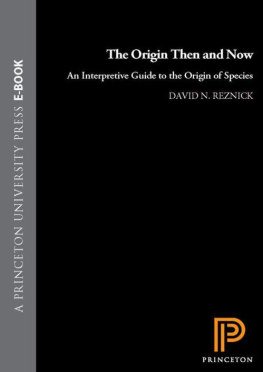Samuel Wilberforce - Art. VII On the Origin of Species
Here you can read online Samuel Wilberforce - Art. VII On the Origin of Species full text of the book (entire story) in english for free. Download pdf and epub, get meaning, cover and reviews about this ebook. City: London, year: 1860, genre: Science. Description of the work, (preface) as well as reviews are available. Best literature library LitArk.com created for fans of good reading and offers a wide selection of genres:
Romance novel
Science fiction
Adventure
Detective
Science
History
Home and family
Prose
Art
Politics
Computer
Non-fiction
Religion
Business
Children
Humor
Choose a favorite category and find really read worthwhile books. Enjoy immersion in the world of imagination, feel the emotions of the characters or learn something new for yourself, make an fascinating discovery.

- Book:Art. VII On the Origin of Species
- Author:
- Genre:
- Year:1860
- City:London
- Rating:3 / 5
- Favourites:Add to favourites
- Your mark:
- 60
- 1
- 2
- 3
- 4
- 5
Art. VII On the Origin of Species: summary, description and annotation
We offer to read an annotation, description, summary or preface (depends on what the author of the book "Art. VII On the Origin of Species" wrote himself). If you haven't found the necessary information about the book — write in the comments, we will try to find it.
Art. VII On the Origin of Species — read online for free the complete book (whole text) full work
Below is the text of the book, divided by pages. System saving the place of the last page read, allows you to conveniently read the book "Art. VII On the Origin of Species" online for free, without having to search again every time where you left off. Put a bookmark, and you can go to the page where you finished reading at any time.
Font size:
Interval:
Bookmark:

[Wilberforce, Samuel,] (Review of) On the origin of species, Quarterly Review, 1860, pp. 225-264. Original page numbers appear in square brackets. Digitized by John van Wyhe, Ph.D., Cambridge University.
ANY contribution to our Natural History literature from the pen of Mr. C. Darwin is certain to command attention. His scientific attainments, his insight and carefulness as an observer, blended with no scanty measure of imaginative sagacity, and his clear and lively style, make all his writings unusually attractive. His present volume on the 'Origin of Species' is the
[226] result of many years of observation, thought, and speculation; and is manifestly regarded by him as the 'opus' upon which his future fame is to rest. It is true that he announces it modestly enough as the mere precursor of a mightier volume. But that volume is only intended to supply the facts which are to support the completed argument of the present essay. In this we have a specimen-collection of the vast accumulation; and, working from these as the high analytical mathematician may work from the admitted results of his conic sections, he proceeds to deduce all the conclusions to which he wishes to conduct his readers.The essay is full of Mr. Darwin's characteristic excellences, It is a most readable book; full of facts in natural history, old and new, of his collecting and of his observing; and all of these are told in his own perspicuous language, and all thrown into picturesque combinations, and all sparkle with the colours of fancy and the lights of imagination. It assumes, too, the grave proportions of a sustained argument upon a matter of the deepest interest, not to naturalists only, or even to men of science exclusively, but to every one who is interested in the history of man and of the relations of nature around him to the history and plan of creation.
The Right Reverend Samuel Wilberforce, D.D. (1870)
With Mr. Darwin's 'argument' we may say in the outset that we shall have much and grave fault to find. But this does not make us the less disposed to admire the singular excellences of his work; and we will seek in limine to give our readers a few examples of these. Here, for instance, is a beautiful illustration of the wonderful interdependence of natureof the golden chain of unsuspected relations which bind together all the mighty web which stretches from end to end of this full and most diversified earth. Who, as he listened to the musical hum of the great humble-bees, or marked their ponderous flight from flower to flower, and watched the unpacking of their trunks for them work of suction, would have supposed that the multiplication or diminution of their race, or the fruitfulness and sterility of the red clover, depend as directly on the vigilance of our cats as do those of our well-guarded game-preserves on the watching of ou keepers? Yet this Mr. Darwin has discovered to be literally the case:
'From experiments which I have lately tried, I have found that the visits of bees are necessary for the fertilisation of some kinds of clover; but humble-bees alone visit the red clover (Trifolium pratense), as other "bees cannot reach the nectar. Hence I have very little doubt, that if the whole genus of humble-bees became extinct car very rare in England, the heartsease and red clover would become [226/227] very rare or wholly disappear. The number of humble-bees in any district depends in a great degree on the number of field-mice, which destroy their combs and nests; and Mr. H. Newman, who has long attended to the habits of humble-bees, believes that "more than two-thirds of them are thus destroyed all over England." Now the number of mice is largely dependent, as every one knows, on the number of cats; and Mr. Newman says, " near villages and small towns I have found the nests of humble-bees more numerous than elsewhere, which I attribute to the number of cats that destroy the mice." Hence, it is quite credible that the presence of a feline animal in large numbers in a district might determine, through the intervention, first of mice, and then of bees, the frequency of certain flowers in that district.'p. 74.
Again, how beautiful are the experiments recorded by him concerning that wonderful relation of the ants to the aphides, which would almost warrant us in giving to the aphis the name of Vacca formicaria:
' One of the strongest instances of an animal apparently performing an action for the sole good of another with which I am acquainted is that of aphides voluntarily yielding their sweet excretion to ants. That they do so voluntarily the following facts will show. I removed all the ants from a group of about a dozen aphides on a dock plant, and prevented their attendance during several hours. After this interval, I felt sure that the aphides would want to excrete. I watched them for some time through a lens, but not one of them excreted. I then tickled and stroked them with a hair in the same manner, as well as I could, as the ants do with their antennae, but not one excreted. Afterwards I allowed an ant to visit them, and it immediately seemed, by its eager way of running about, to be well aware what a rich flock it had discovered. It then began to play with, its antennae on the abdomen first of one aphis and then of another, and each aphis, as soon as it felt the antennae, immediately lifted up its abdomen and excreted a limpid drop of sweet juice, which was eagerly devoured by the ant. Even the quite young aphides behaved in this manner, showing that the action was instinctive, and not the result of experience.'pp. 210, 211.
Or take the following admirable specimen of the union of which we have spoken, of the employment of the observations of others with what he has observed himself, in that which is almost the most marvellous of factsthe slave-making instinct of certain ants. We say nothing at present of the place assigned to these facts in Mr. Darwin's argument, but are merely referring to the collection, observation, and statement of the facts themselves: 'Slave-making Instinct.This remarkable instinct was first discovered in the Formica (Polyerges) rufescens by Pierre Huber, a better observer even than his celebrated father. This ant is absolutely dependent on its slaves; without their aid the species would certainly [227/228] become extinct in a single year. The males and fertile females do no work. The workers or sterile females, though most energetic and courageous in capturing slaves, do no other work. They are incapable . of making their own nests or of feeding their own larvae. When the old nest is found inconvenient, and they have to migrate, it is the slaves which determine the migration, and actually carry their masters in their jaws. So utterly helpless are the masters, that when Huber shut up thirty of them without a slave, but with plenty of the food, which they like best, and with their larvae and pup to stimulate them to work, they did nothing; they could not even feed themselves, and many perished of hunger. Huber then introduced a single slave (F. fusca), and she instantly set to work, fed and saved the survivors, made some cells and tended the larvae, and put all to rights. What can be more extraordinary than these well-ascertained facts? If we had not known of any other slave-making ant, it would have been, hopeless to have speculated how so wonderful an instinct could have been perfected. Another species (Formica sanguinea) was likewise first discovered by P. Huber to be a slave-making ant. This species is found in the southern parts of England, and its habits have been attended to by Mr. F. Smith, of the British Museum, to whom I am much indebted for information on this and other subjects, Although fully trusting to the statements of Huber and Mr. Smith, I tried to approach the subject in a sceptical frame of mind, as any one may well be excused for doubting the truth of so extraordinary and odious an instinct as that of making slaves. Hence I give the observations which I have myself made in some little detail. I opened fourteen nests of F. sanguinea, and found a few slaves in each. Males and fertile females of the slave-species (F. fusca) are found only in their own proper communities, and have never been observed in the nests of F. sanguinea. The slaves are black, and not above half the size of their red masters, so that the contrast in their appearance is very great. When the nest is slightly disturbed, the slaves occasionally come out, and, like their masters, are much agitated, and defend the nest. When the nest is much disturbed, and the larvae and pupaa are exposed, the slaves work energetically with their masters in carrying them away to a place of safety. Hence it is clear that the slaves feel quite at home. During the months of June and July, in three successive years, I have watched for many hours several nests in Surrey and Sussex, and never saw a slave either leave or enter a nest. As, during these months, the slaves are very few in number, I thought that they might behave differently when more numerous, but Mr. Smith informs me that he has watched nests at various hours during May, June, and August both in Surrey and Hampshire, and has never seen the slaves, though present in large numbers in August, either leave or enter the nest. Hence he considers them as strictly household slaves. The masters, on the other hand, may be constantly seen bringing in materials for the nest and food of all kinds. During the present year, however, in the month of July, I came across a community with an unusually large stock of slaves, and I observed a few
Font size:
Interval:
Bookmark:
Similar books «Art. VII On the Origin of Species»
Look at similar books to Art. VII On the Origin of Species. We have selected literature similar in name and meaning in the hope of providing readers with more options to find new, interesting, not yet read works.
Discussion, reviews of the book Art. VII On the Origin of Species and just readers' own opinions. Leave your comments, write what you think about the work, its meaning or the main characters. Specify what exactly you liked and what you didn't like, and why you think so.

